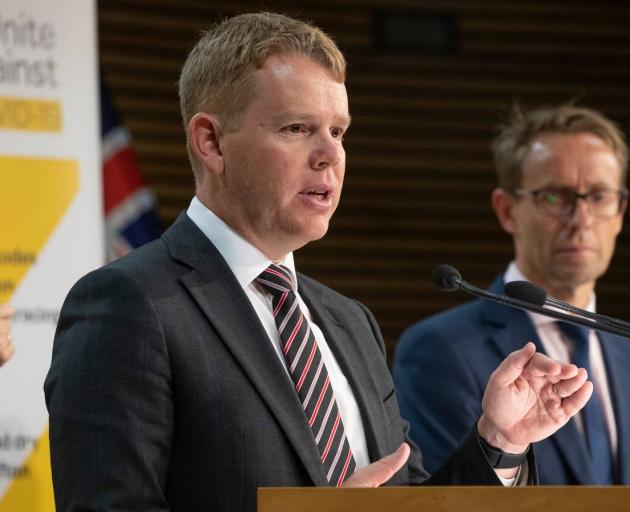The managed isolation system at New Zealand's border is being dismantled for fully vaccinated Kiwis, and travellers will be able to bypass it from early next year.
It comes as officials announced there are 215 Covid-19 community cases today. Today's cases mean the number of Delta outbreak infections has now surpassed 5000.
Of today's cases, 181 are in Auckland, 18 in Waikato, 12 in Bay of Plenty and three in Northland.
There is also a historic case reported in Canterbury. They are a close contact of a previously reported case and no longer considered infectious.
Covid-19 Response Minister Chris Hipkins said today that from next year it would be easier for fully vaccinated Kiwis to return to New Zealand.
From January 17, fully vaccinated New Zealanders would be able to travel from Australia without having to go through MIQ, but would need to isolate at home for seven days, he said.
From February 13, fully vaccinated Kiwis can travel from all other countries.
From the end of April, all other fully vaccinated travellers can come into New Zealand without needing to go into MIQ.
However, travel in 2022 would not be the same as pre-2020, Hipkins warned.
All travellers will require a negative test, proof of vaccination and declaration they haven't been in very high-risk countries. They will also require regular testing after they have arrived.
A phased approach to reconnecting New Zealand to the world was the safest approach to protect vulnerable communities and the health system, Hipkins said
The three steps constituted a new "medium-risk pathway".
Those who don't fit this pathway will go through MIQ for seven days and then self-isolation for three days.
Hipkins also revealed the 'very high-risk' classification for Indonesia, Fiji, India, Pakistan and Brazil will be removed early next month.
Travellers from these countries can enter New Zealand on the same basis as travellers from most other countries, he said.
Papua New Guinea will continue to be classified as high-risk so only New Zealand citizens and their dependants can travel directly to NZ from PNG. All travellers from PNG who aren't citizens must spent 14 days in a non-very high risk country before coming here and humanitarian exemptions are still available.
"As we move in 2022, we know that the pandemic is not over and it's not going to suddenly end and we only need to look at Europe to know that the path out of the pandemic is not a straight-forward one."

In a statement today, the Ministry of Health said there were 87 people in hospital with the disease today, including eight in ICU.
The ministry advised that of the 15 people who had died with Covid in the Delta outbreak, 10 were unvaccinated, two had had one dose and three were fully vaccinated.
There were 18,880 first and second vaccine doses administered yesterday, made up of 6496 first doses and 12,384 second doses. To date, 92% of eligible people in New Zealand have had their first dose and 84% are fully vaccinated.
As vaccination rates rise, the numbers of cases, hospitalisations and deaths will rise among the vaccinated, Director-general of health Dr Ashley Bloomfield said at the press conference today.
Bloomfield emphasised that a number of people hopsitalised in the outbreak were children under 12.
Earlier in the week, Prime Minister Jacinda Ardern said more guidance on the traffic lights system was due this week, including advice specific to sectors such as retail, schools and sporting events.
From tomorrow, hairdressers in Auckland can reopen using appointments to trial the new vaccination certificate system. All staff must be vaccinated, and they can only accept vaccinated customers.
Parliament is sitting in urgency to rush through the law changes needed to allow businesses to implement the vaccines certificate system.
That law change includes allowing businesses to require staff to get vaccinated if they work in roles where they interact with the public.
Workplaces considered high-risk include hospitality, events, gatherings, close contact businesses and gyms - mandates are expected to cover about 40 percent of the workforce overall.
On Monday, Ardern announced that the country would move to the traffic light system on December 3.
Auckland will start off at the most restricted "red" setting, because of the ongoing community outbreak. The settings for most other regions will not be announced until November 29, when Cabinet reviews vaccination rates.
Ardern has promised Cabinet would be "pragmatic" if a region's rates of fully vaccinated people were getting close to the 90 per cent mark but it was likely lower vaccinated regions, especially if they were also summer hotspots, would be at red.
Details on what it will take for Auckland to move from red to orange were not likely this week.
Hipkins told RNZ that the Government would look at case numbers, rate of hospitalisation, contact tracing capability, and the nature of communities the cases are in.
More details will be revealed next week.
- additional reporting RNZ












